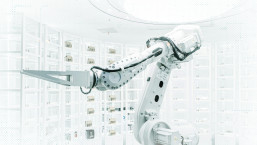At 15 payment machines dotted around the Swedish city of Lund, people can buy items without needing a card - or a phone equipped with a “Near Field” chip. All that’s required are the correct veins.
Engineering graduate Frederik Leifland says, “I got the idea when I was in line at the supermarket and I saw how complex a process paying is. It takes a lot of time so I thought there must be an easier and quicker way to pay and that was the start of Quixter.”
In a new interview with science website Humans Invent, Leifland explains how he hopes that his start-up may lead to payments without any authentication device. The pattern of veins in a human hand is unique - Leifland’s system uses infrared scans to identify the unique pattern in a finger.
BioMetrics sales site FindBiometrics says that the technology is new, and currently used in high security institutions, saying, “Vein recognition is a fairly recent technological advance in the field of biometrics. It is used in hospitals, law enforcement, military facilities and other applications that require very high levels of security.”
TechCrunch points out that vein recognition technology is already used to secure high-value banking transactions in countries such as Japan, but only as a secondary “layer” of security where other methods of authentication are also used.
Leifland claims that his company, Quixter, is not the only start-up researching the technology - but is the first to market with it. He aims to create a payment system which requires neither physical money, nor phones, nor mobile devices.
There are currently around 1,600 testers of the system, Tech Times reports.
Leifland says that in a retail environment, transactions can be completed in around five seconds.
“When you go to pay in the supermarket you enter the last four digits of your phone number and then you hold your hand above the sensor. The transaction takes less than 5 seconds,” he says.
Leifland says the reason for entering the last four digits of your phone number is done in order to make you look at the terminal and confirm you are paying the correct amount.
Biometric payment systems are a hot topic at the moment, with Samsung’s Galaxy S5 shipping with a PayPal system, and other start-ups are investigating systems using iris scans and other biometric techniques.
A poll of 10,000 iPhone and Android users by network giant Ericsson found that consumer appetite for biometrics was high - and Ericsson predicted that fingerprints would “just be the start.”
“Consumers would rather get rid of passwords completely, and for this reason are showing interest in biometric alternatives,” a spokesman said.
Stephen Cobb, Senior Security Researcher with ESET, thinks we may be on the verge of widespread deployment of biometrics. Cobb says, “Successful implementation of biometrics in a segment leading product could bode well for consumer acceptance.” He adds, “I have been a fan of biometrics as an added authentication factor ever since I first researched multi-factor and 2FA systems 20 years ago, however, user adoption is very sensitive to performance; in other words devices such as the iPhone 5S could advance biometrics, or put a whole lot of people off biometrics.”




